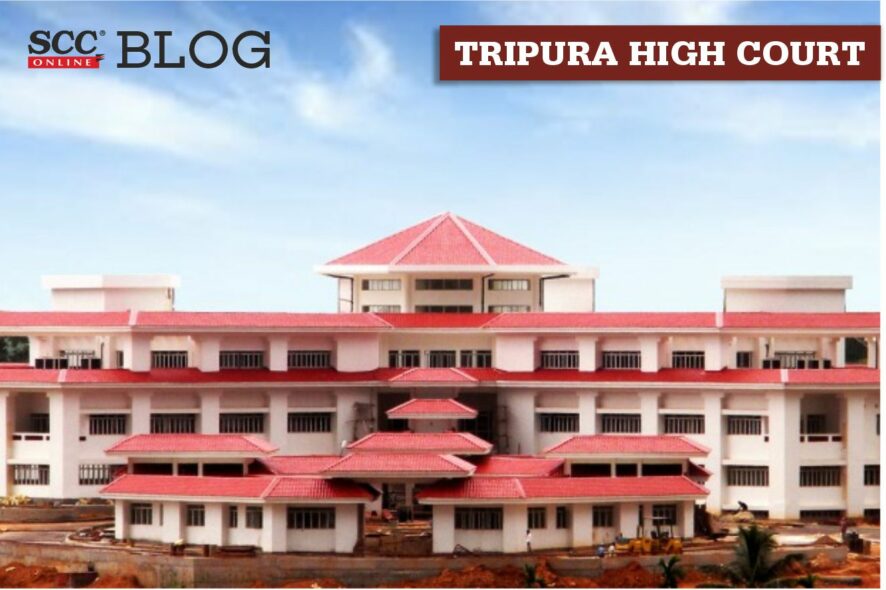Tripura High Court: In a batch of writ petitions filed for directing the State Government to provide similar Pension benefit as granted to the other similarly situated Tripura Government Undertakings, Arindam Lodh, J. has held that the writ court while exercising the power of judicial review under Article 226 of the Constitution of India will not as a court of appeal sit over the well-reasoned report of the expert body, thereby observed that providing grants or other benefits to any of the organizations is a matter of policy decision of the government and the court cannot direct the State or its instrumentalities to formulate such policy
The issues in the present matter were, whether the court can direct the State government to provide necessary funds to the corporation, and whether the court can determine the amount of pension an employee may be entitled to.
The Court took note of the report of the expert committee constituted by the State government, wherein it is found that provision of providing pension benefit to these organizations has been made either by adopting the Civil Services (Pension) Rules, 1972 or introducing separate pension scheme. Further, these autonomous bodies had created a separate scheme and had been able to generate their own funds from their own contribution and opened subscriber accounts with specified schemes of the organization like Life Insurance Corporation of India (LICI), banks etc. Moreover, the petitioners have already retired from service, and are drawing pension under Employees Provident Fund scheme.
The Court further noted that the service conditions including pension scheme of the employees of these corporations are governed by their respective statutes, as the corporations are government undertakings. Further, all the corporations are utilizing the funds provided by the State government even to the extent of 100%, and have been running in loss, though, these organizations are supposed to be profit making as observed by the expert committee. Thus, the court held that “the employees of these statutory organizations cannot claim, as a matter of right, the pensionary benefits, as provided to few of the corporations who have been able to generate their own funds with one-time support from the state government”
Furthermore, the Court viewed that the petitioners cannot be treated equally to the employees of those organizations whose pension schemes have been introduced under different schemes with the assistance of some other organizations like LICI, banks, etc., as the pension of the members of the petitioner’s organization is based on the pension scheme subscribed by them during his/her service tenure in the respective organization and are primarily controlled and regulated by the Employees Provident Fund Organisation. Thus, the petitioners cannot complain of discrimination having regard to the equity clause enshrined under Article 14 of the Constitution of India.
Moreover, the Court observed that providing grants or other benefits to any of the organizations is a matter of policy decision of the government, the court cannot direct the State or its instrumentalities to formulate certain policy because it would have a scaring effect having huge financial implication, thus, it should be left to the expert committee.
The Court also observed that the grant of pensionary benefit is not a one-time payment and extension of such benefit is a recurring expenditure with continuous liability involving huge government funds. The State Government and the corporation should ultimately take a policy decision as to whether such benefits should be provided to its employees or not, as it is outside the court’s jurisdiction to make an enquiry regarding the fund status of the respective corporation or to choose a scheme suitable to the employees of such corporation without the aid and advice of the expert body.
Moreover, the Court viewed that it is a settled proposition of law that the interference of the judiciary to such a policy matter having serious financial implication and/or having a cascading effect is not at all warranted and justified. Further, it held that “the writ court while exercising the power of judicial review under Article 226 of the Constitution of India will not as a court of appeal sit over the well-reasoned report of the expert body following the well-neigh principle of self-restraint in the matter of policy decisions of the government”. Thus, the Court dismissed the writ petitions.
[All Tripura EPS Pensioners’ and Employees’ Association v. State of Tripura, 2022 SCC OnLine Tri 619, decided on 06.09.2022]
Advocates who appeared in this case:
For Appellant(s): Advocate S. Saha
Advocate S. Datta
For Respondent(s): Advocate KC Bhattacharjee
Advocate B.S. Bhowmik
Advocate S. Bhattacharjee
Advocate AK Pal
Advocate D. Sarkar
Advocate A. Chakraborty
Advocate HC Chakraborty






